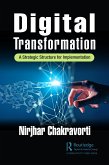The Routledge Companion to Management Information Systems
Herausgeber: Baiyere, Abayomi; Galliers, Robert D.; Stein, Mari-Klara
The Routledge Companion to Management Information Systems
Herausgeber: Baiyere, Abayomi; Galliers, Robert D.; Stein, Mari-Klara
- Gebundenes Buch
- Merkliste
- Auf die Merkliste
- Bewerten Bewerten
- Teilen
- Produkt teilen
- Produkterinnerung
- Produkterinnerung
This volume examines the progress made in the field of Information Systems in recent years in and presents a forward-looking perspective that can help to shape future scholarly conversations both in the field of Information Systems but also in cognate fields where information technology is having profound effects.
Andere Kunden interessierten sich auch für
![The Routledge Companion to Production and Operations Management The Routledge Companion to Production and Operations Management]() The Routledge Companion to Production and Operations Management354,99 €
The Routledge Companion to Production and Operations Management354,99 €![The Routledge Companion to Organizational Diversity Research Methods The Routledge Companion to Organizational Diversity Research Methods]() The Routledge Companion to Organizational Diversity Research Methods305,99 €
The Routledge Companion to Organizational Diversity Research Methods305,99 €![The Routledge Companion to Disability and Work The Routledge Companion to Disability and Work]() The Routledge Companion to Disability and Work305,99 €
The Routledge Companion to Disability and Work305,99 €![The Routledge Companion to Corporate Social Responsibility The Routledge Companion to Corporate Social Responsibility]() The Routledge Companion to Corporate Social Responsibility305,99 €
The Routledge Companion to Corporate Social Responsibility305,99 €![Capitalizing Your Technology to Disrupt and Dominate Your Markets Capitalizing Your Technology to Disrupt and Dominate Your Markets]() Aviv Ben-YosefCapitalizing Your Technology to Disrupt and Dominate Your Markets133,99 €
Aviv Ben-YosefCapitalizing Your Technology to Disrupt and Dominate Your Markets133,99 €![Digital Transformation Digital Transformation]() Nirjhar ChakravortiDigital Transformation153,99 €
Nirjhar ChakravortiDigital Transformation153,99 €![Process-Centric Architecture for Enterprise Software Systems Process-Centric Architecture for Enterprise Software Systems]() Parameswaran SeshanProcess-Centric Architecture for Enterprise Software Systems135,99 €
Parameswaran SeshanProcess-Centric Architecture for Enterprise Software Systems135,99 €-
-
-
This volume examines the progress made in the field of Information Systems in recent years in and presents a forward-looking perspective that can help to shape future scholarly conversations both in the field of Information Systems but also in cognate fields where information technology is having profound effects.
Hinweis: Dieser Artikel kann nur an eine deutsche Lieferadresse ausgeliefert werden.
Hinweis: Dieser Artikel kann nur an eine deutsche Lieferadresse ausgeliefert werden.
Produktdetails
- Produktdetails
- Verlag: Taylor & Francis Ltd
- 2. Auflage
- Seitenzahl: 322
- Erscheinungstermin: 2. Juni 2025
- Englisch
- Abmessung: 246mm x 174mm
- ISBN-13: 9781032690469
- ISBN-10: 1032690461
- Artikelnr.: 72600361
- Herstellerkennzeichnung
- Libri GmbH
- Europaallee 1
- 36244 Bad Hersfeld
- gpsr@libri.de
- Verlag: Taylor & Francis Ltd
- 2. Auflage
- Seitenzahl: 322
- Erscheinungstermin: 2. Juni 2025
- Englisch
- Abmessung: 246mm x 174mm
- ISBN-13: 9781032690469
- ISBN-10: 1032690461
- Artikelnr.: 72600361
- Herstellerkennzeichnung
- Libri GmbH
- Europaallee 1
- 36244 Bad Hersfeld
- gpsr@libri.de
Robert D. Galliers is Bentley University's Distinguished Professor Emeritus having served as Provost (2002-2009) and Professor Emeritus, University of Warwick, having served as Dean of Warwick Business School (1994-1998). Previously, he was Professor and Research Director in the Department of Information Systems at the London School of Economics (2000-2002), the Lucas Professor of Business Management Systems at Warwick Business School (1989-2000), and Foundation Professor of Information Systems at Curtin University, Western Australia (where he was Head of the School of Information Systems, 1983-1989). Bob Galliers has also held a number of visiting professorships (including at the Australian School of Business, University of New South Wales; Hong Kong City and Hong Kong Polytechnic Universities; University of St Gallen, Switzerland; INSEAD, France; Loughborough University, UK; University of the Witwatersrand, South Africa; National University of Singapore, and the European Institute for Advanced Studies in Management, Belgium). He has served on various university advisory boards (currently, Queen's University, Northern Ireland; Bradford University, UK, and Turku School of Business, Finland). He is a Fellow of the British Computer Society, the Royal Society of Arts, and the Association for Information Systems, of which he was President in 1999. He received the Association for Information Systems LEO Award for exceptional lifetime achievement in the field in 2012 and an Honorary Doctor of Science degree from Turku University, Finland in 1995. He served as Program Chair for the International Conference on Information Systems (Barcelona, 2002). Bob Galliers is the founding editor-in-chief of The Journal of Strategic Systems (1991-2018). His papers have been published in such leading Information Systems and Management journals as: MISQ; JAIS; JMIS; JSIS; EJIS; ISJ; JIT; I&O; I&M; SMJ; LRP, and BJM), and has been cited over 18,000 times according to Google Scholar. His most recent book is The Cambridge Handbook of Qualitative Digital Research (CUP, 2023). Earlier books include: Exploring Information Systems Research Approaches: Readings and Reflections, London: Routledge, 2007, Strategic Information Management: Challenges and Strategies in Managing Information Systems, 4th Edition, Routledge, 2009, The Oxford Handbook of Information Systems: Critical Perspectives and New Directions, Oxford University Press, 2011, Management Information Systems: Critical Perspectives on Business and Management, Vols I-IV. Routledge, 2015, The Routledge Companion to Management Information Systems, Routledge, 2017, Strategic Information Management: Theory and Practice, 5th Edition, Routledge. 2019, Managing Digital Innovation: A Knowledge Perspective, Red Globe Press, 2020. Abayomi Baiyere is associate professor at Smith Business School, Queen's University, Canada. He is also an affiliate at Copenhagen Business School, Denmark and a docent at the University of Turku, Finland. Until recently, he served as a research affiliate at the Center for Information Systems Research (CISR) of Massachusetts Institute of Technology (MIT). His research focuses on digital transformation, digital disruption and the societal implications of digitalization (e.g., digital work). He serves as the president of the Digital Innovation, Transformation and Entrepreneurship (DITE) special interest group (SIG) of the Association for Information Systems and, until recently, was the lead of the Digital Disruption and Transformation SIG of the International Society of Professional Innovation Management (ISPIM). He has served in editorial roles as associate editor, guest senior editor or editorial board member of several journals. His works have been accepted for publication in leading information systems and management journals such as Management Information Systems Quarterly (MISQ), Information Systems Research (ISR), Journal of the AIS (JAIS), Technological Forecasting and Social Change (TFSC), California Management Review, among several others. Some of his publications have been recognized with best paper awards/nominations. Mari-Klara Stein is professor of management at the department of Business Administration, TalTech. Mari earned her doctorate at Bentley University (USA). Her research focuses on the digital transformation of work. Mari publishes her work in top management and information systems journals (e.g., MIS Quarterly, Journal of Management Studies, Information Systems Research). Mari is currently serving as an Associate Editor at MIS Quarterly and Senior Editor at Information & Organization.
Part I: Disciplinary Theoretical and Methodological Foundations 1.
Introduction 2. The explosion of scope for information systems research 3.
Computationally Intensive Theory Construction 4. The Imperative for Laws
for Information Systems Theorizing 5. IMPLEMENTATION SCIENCE IN INFORMATION
SYSTEMS RESEARCH Part II: Digital Phenomena 6. Introduction 7. Digital
infrastructures in the Roaring Twenties: Taking stock and moving forward
8. DIGITAL RESILIENCE: A Roadmap for IS Research and Practice 9. Digital
Sustainability: A Framing Theory Perspective 10. Digital Innovation -
Definition and Research Frontiers Part III: Development, Adoption and Use
of MIS 11. Introduction 12. Research on user resistance to information
technology 13. Affordance Theory and How to Use it in IS Research (Revised)
14. Affect in the ICT context 15. NeuroIS Part IV: Managing Organizational
IS, Knowledge and Innovation 16. Introduction 17. Agile Enterprise
Architecture: A Recombination Perspective 18. The next frontiers of online
privacy 19. Imagining Futures of Digital Work: Exploring Paradoxes Through
Speculative Fiction 20. Aligning in Practice: Evidence from Published Cases
Part V: Emerging Technologies. IS in Society. Global Considerations -
Issues and Controversies 21. Introduction 22. Still Staying Alive: Praxis,
Design, and Art in the Information Systems Field 23. Tokenization: A
Foundation for Digitized Inter-organizational Relationships 24. Machine
Learning in Information Systems Research: Current and Future Applications,
Development, and Challenges 25. Technology-driven changes in the economy
Introduction 2. The explosion of scope for information systems research 3.
Computationally Intensive Theory Construction 4. The Imperative for Laws
for Information Systems Theorizing 5. IMPLEMENTATION SCIENCE IN INFORMATION
SYSTEMS RESEARCH Part II: Digital Phenomena 6. Introduction 7. Digital
infrastructures in the Roaring Twenties: Taking stock and moving forward
8. DIGITAL RESILIENCE: A Roadmap for IS Research and Practice 9. Digital
Sustainability: A Framing Theory Perspective 10. Digital Innovation -
Definition and Research Frontiers Part III: Development, Adoption and Use
of MIS 11. Introduction 12. Research on user resistance to information
technology 13. Affordance Theory and How to Use it in IS Research (Revised)
14. Affect in the ICT context 15. NeuroIS Part IV: Managing Organizational
IS, Knowledge and Innovation 16. Introduction 17. Agile Enterprise
Architecture: A Recombination Perspective 18. The next frontiers of online
privacy 19. Imagining Futures of Digital Work: Exploring Paradoxes Through
Speculative Fiction 20. Aligning in Practice: Evidence from Published Cases
Part V: Emerging Technologies. IS in Society. Global Considerations -
Issues and Controversies 21. Introduction 22. Still Staying Alive: Praxis,
Design, and Art in the Information Systems Field 23. Tokenization: A
Foundation for Digitized Inter-organizational Relationships 24. Machine
Learning in Information Systems Research: Current and Future Applications,
Development, and Challenges 25. Technology-driven changes in the economy
Part I: Disciplinary Theoretical and Methodological Foundations 1.
Introduction 2. The explosion of scope for information systems research 3.
Computationally Intensive Theory Construction 4. The Imperative for Laws
for Information Systems Theorizing 5. IMPLEMENTATION SCIENCE IN INFORMATION
SYSTEMS RESEARCH Part II: Digital Phenomena 6. Introduction 7. Digital
infrastructures in the Roaring Twenties: Taking stock and moving forward
8. DIGITAL RESILIENCE: A Roadmap for IS Research and Practice 9. Digital
Sustainability: A Framing Theory Perspective 10. Digital Innovation -
Definition and Research Frontiers Part III: Development, Adoption and Use
of MIS 11. Introduction 12. Research on user resistance to information
technology 13. Affordance Theory and How to Use it in IS Research (Revised)
14. Affect in the ICT context 15. NeuroIS Part IV: Managing Organizational
IS, Knowledge and Innovation 16. Introduction 17. Agile Enterprise
Architecture: A Recombination Perspective 18. The next frontiers of online
privacy 19. Imagining Futures of Digital Work: Exploring Paradoxes Through
Speculative Fiction 20. Aligning in Practice: Evidence from Published Cases
Part V: Emerging Technologies. IS in Society. Global Considerations -
Issues and Controversies 21. Introduction 22. Still Staying Alive: Praxis,
Design, and Art in the Information Systems Field 23. Tokenization: A
Foundation for Digitized Inter-organizational Relationships 24. Machine
Learning in Information Systems Research: Current and Future Applications,
Development, and Challenges 25. Technology-driven changes in the economy
Introduction 2. The explosion of scope for information systems research 3.
Computationally Intensive Theory Construction 4. The Imperative for Laws
for Information Systems Theorizing 5. IMPLEMENTATION SCIENCE IN INFORMATION
SYSTEMS RESEARCH Part II: Digital Phenomena 6. Introduction 7. Digital
infrastructures in the Roaring Twenties: Taking stock and moving forward
8. DIGITAL RESILIENCE: A Roadmap for IS Research and Practice 9. Digital
Sustainability: A Framing Theory Perspective 10. Digital Innovation -
Definition and Research Frontiers Part III: Development, Adoption and Use
of MIS 11. Introduction 12. Research on user resistance to information
technology 13. Affordance Theory and How to Use it in IS Research (Revised)
14. Affect in the ICT context 15. NeuroIS Part IV: Managing Organizational
IS, Knowledge and Innovation 16. Introduction 17. Agile Enterprise
Architecture: A Recombination Perspective 18. The next frontiers of online
privacy 19. Imagining Futures of Digital Work: Exploring Paradoxes Through
Speculative Fiction 20. Aligning in Practice: Evidence from Published Cases
Part V: Emerging Technologies. IS in Society. Global Considerations -
Issues and Controversies 21. Introduction 22. Still Staying Alive: Praxis,
Design, and Art in the Information Systems Field 23. Tokenization: A
Foundation for Digitized Inter-organizational Relationships 24. Machine
Learning in Information Systems Research: Current and Future Applications,
Development, and Challenges 25. Technology-driven changes in the economy








